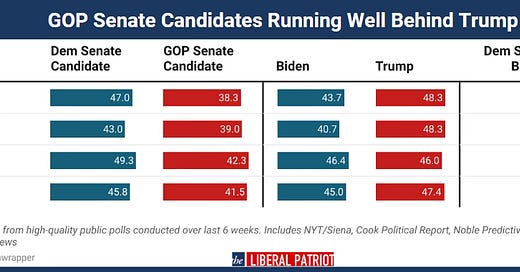The GOP Senate Candidates Trailing Trump
Look at vote share, not just margin, when assessing the 2024 U.S. Senate map.
A strange phenomena has dominated battleground polling thus far: Donald Trump leads across the board, while GOP candidates for the U.S. Senate trail by considerable margins.
In Arizona, Trump is ahead by several points, but Kari Lake trails by near double-digits. In Nevada, Biden trails by a whopping 7.6 points, but Democrat Jacky Rosen leads Republican Sam Brown by four. In Wisconsin and Pennsylvania, too, similar gaps emerge.
What explains such substantial differences? Has the ticket-splitting of eras past suddenly returned in full force?
The New York Times’ Nate Cohn posits that young and Hispanic voters are driving the split. While Trump and Biden are about tied with both demographics, Democratic Senate candidates hold roughly 20-point leads across the battlegrounds. A historical shift at the presidential level; a “normal” election at the Senate level. The argument is reasonable: Biden does appear uniquely weak with certain core Democratic constituencies. But a look at vote share rather than margin offers a more comprehensive picture of the race.
Democratic Senate candidates’ average vote share is a couple points higher than Biden—a finding that tracks with Biden’s broader weakness. Yet GOP Senate candidates often run 6-10 points behind Trump. Even with increased ticket-splitting, such gaps seem unlikely. Donald Trump will not earn a vote share 9 points higher than Sam Brown or 6 points higher than Pennsylvania’s Dave McCormick.
This suggests two things:
Part of the Democratic advantage in Senate polling owes to a higher number of undecideds in down-ballot races.
Something has to give.
Either Trump’s vote share is going to drop or the GOP Senate candidates will draw closer to the top of the ticket. And the latter is far more likely.
This is not to say Senate results will perfectly match presidential results. Split outcomes remain possible, particularly if Trump carries several of the battlegrounds. But as Election Day draws closer, expect the GOP to narrow their deficits in key Senate races.






